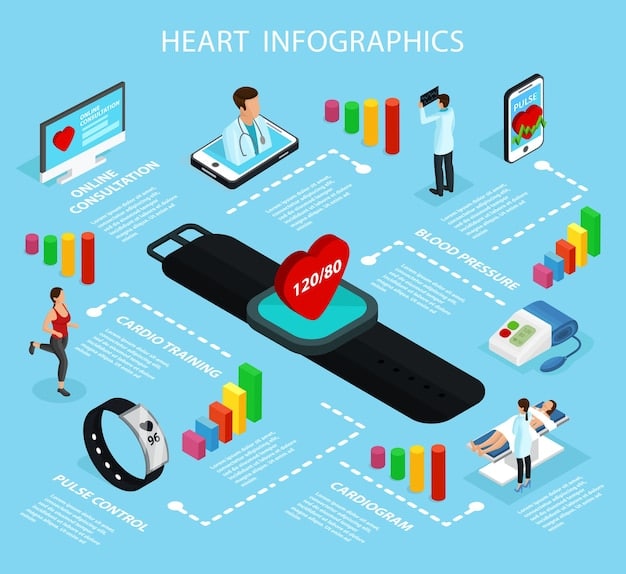Smartwatch Stress Sensors: Can They Really Reduce Your Anxiety?

A data-driven analysis explores whether the latest smartwatch stress sensors can effectively reduce anxiety by providing real-time feedback and promoting mindful practices.
Do the latest smartwatches equipped with stress sensors offer a tangible solution for anxiety reduction? This data-driven analysis explores if these wearable technologies can truly make a difference in managing stress levels and promoting overall well-being by exploring Will the Latest Smartwatch Stress Sensors Actually Reduce Anxiety? A Data-Driven Analysis.
Understanding Smartwatch Stress Sensors
Smartwatches have evolved beyond simple fitness trackers, now incorporating sophisticated sensors aimed at monitoring various health metrics. Among these advancements, stress sensors have gained prominence, promising users insights into their stress levels.
How Smartwatch Stress Sensors Work
Smartwatch stress sensors typically rely on heart rate variability (HRV) as a key indicator. HRV refers to the variation in time intervals between heartbeats. When you’re relaxed, your HRV tends to be higher, reflecting a more flexible and adaptable nervous system. Conversely, during periods of stress, your HRV decreases as your body enters a state of heightened alert.
These sensors work by measuring your heart rate throughout the day and then calculating your HRV. Algorithms analyze the data to estimate your stress levels, often presenting this information to you through easy-to-understand graphics and scores on your smartwatch or smartphone app.
- Heart Rate Variability (HRV): Measures the variation in time intervals between heartbeats, a key indicator of stress levels.
- Data Analysis: Algorithms analyze heart rate data to estimate stress levels.
- Real-time Feedback: Provides users with immediate insights into their stress levels throughout the day.
It’s important to note that the accuracy of these sensors can vary. Factors like skin contact, sensor quality, and individual physiological differences can influence the reliability of the measurements. However, many users find that the trend data provided by these sensors is valuable in identifying patterns and triggers related to their stress.

The Science Behind Stress and Anxiety
While the terms stress and anxiety are often used interchangeably, it’s crucial to understand the distinction between them to truly address the efficacy of smartwatch stress sensors. Stress is a natural physiological response to demanding situations. On the other hand, anxiety is a more persistent and excessive worry or fear, often disproportionate to the actual threat.
The Body’s Response to Stress
When encountering a stressful situation, the body activates the sympathetic nervous system, triggering the release of hormones like cortisol and adrenaline. This “fight-or-flight” response prepares the body for immediate action by increasing heart rate, blood pressure, and alertness.
Acute stress can be beneficial, enhancing focus and performance in certain situations. However, chronic stress — prolonged exposure to stressors — can have detrimental effects on physical and mental health, contributing to anxiety disorders, cardiovascular problems, and weakened immune function. Here’s how chronic stress can take a toll:
- Cardiovascular Issues: Can lead to increased blood pressure and heart problems.
- Weakened Immune System: Makes you more susceptible to illnesses.
- Mental Health Disorders: Contributes to anxiety and depression.
Smartwatch stress sensors primarily detect the physiological signs of stress, such as changes in HRV. While these sensors can’t diagnose anxiety disorders, they offer a means to track and manage stress levels, potentially preventing them from escalating into more severe anxiety conditions. By utilizing smartwatch stress sensors, individuals gain a tangible method for keeping tabs on their tension, which can then mitigate the intensity of chronic stress.
Do Smartwatch Stress Sensors Reduce Anxiety? The Data
The central question is whether the data collected by smartwatch stress sensors can genuinely contribute to reducing anxiety. While the answer is multifaceted and depends on various factors, existing research and user experiences offer valuable insights.
Several studies have explored the effectiveness of wearable technology in managing stress and anxiety. Some research suggests that real-time feedback from these devices can promote self-awareness and encourage users to adopt stress-reducing behaviors. These findings imply that consistent monitoring and acknowledgement of stress indicators from the watch’s sensors can be a catalyst for change.
Studies and Research Findings
- Increased Self-Awareness: Real-time feedback promoting better understanding of personal stress triggers.
- Behavioral Changes: Encouraging the adoption of stress-reducing activities.
- Mindfulness Techniques: Promoting practices to manage stress and improve mental well-being.
However, it’s crucial to approach these findings with caution. Some studies have yielded mixed results, highlighting the need for more rigorous research with larger sample sizes and control groups. The effectiveness of smartwatch stress sensors can vary depending on individual factors such as age, lifestyle, and pre-existing mental health conditions. While these sensors may not be a standalone solution for anxiety disorders, they can serve as a valuable tool when combined with other therapeutic approaches.

Integrating Mindfulness and Relaxation Techniques
The effectiveness of smartwatch stress sensors is significantly amplified when combined with mindfulness and relaxation techniques. These tools can provide real-time insights into your stress levels, the most beneficial approach involves actively engaging in practices designed to calm the mind and body.
Mindfulness involves focusing your attention on the present moment without judgment. Techniques like deep breathing exercises, meditation, and mindful walking can help reduce stress by promoting relaxation and cultivating a sense of inner peace.
Mindfulness in Daily Life
Integrating mindfulness into your daily routine can be as simple as taking a few moments to notice your breath, observe your surroundings, or savor a meal without distractions. These small practices can have a profound impact on your stress levels and overall well-being. With these practices, one can anticipate gaining the following:
- Improved Focus: Enhancing concentration and reducing mental clutter.
- Emotional Regulation: Gaining better control over emotional responses.
- Reduced Reactivity: Decreasing impulsive and stress-driven behaviors.
By using the data from your smartwatch stress sensor to identify moments of heightened stress, you can proactively implement mindfulness techniques to mitigate the physiological effects. This integrated approach empowers you to take control of your well-being and cultivate a more balanced and resilient state of mind. Implementing mindfulness makes one more attuned to their own body.
Choosing the Right Smartwatch and Setting Realistic Expectations
Selecting the appropriate smartwatch with stress-sensing capabilities and establishing realistic expectations are crucial for maximizing the utility of this technology for reducing anxiety. The market offers a variety of smartwatches with differing stress-sensing features, accuracy, and overall functionality. Furthermore, you should consider factors such as comfort, user interface, battery life, and compatibility with your existing devices.
Key Factors to Consider
When choosing a smartwatch, prioritize models with accurate and reliable stress sensors. Read reviews, compare specifications, and consider user feedback to make an informed decision. A thorough review of the technical specs will help give an idea of the product.
It’s also important to set realistic expectations. Smartwatch stress sensors are not a magic bullet for anxiety. They are a tool to assist you in monitoring your stress levels and making informed decisions about your well-being. However, they do not substitute professional mental health care. Be sure to remember these crucial facets when buying your smartwatch:
- Sensor Accuracy: Prioritize models with reliable stress sensors.
- Additional Features: Explore other health-tracking capabilities.
- User Experience: Ensure the interface is intuitive and user-friendly.
By approaching smartwatches with a balanced perspective and integrating them as part of a comprehensive approach to mental health, you can harness their potential to reduce stress and improve your overall quality of life. Utilizing them correctly makes all the difference.
Ethical Considerations and Data Privacy
As smartwatches become increasingly integrated into healthcare, it’s essential to consider the ethical implications and data privacy concerns that arise. These devices collect and store sensitive personal information, making it crucial to address security and transparency.
Protecting Your Data
Smartwatch companies have a responsibility to protect user data from unauthorized access, breaches, and misuse. Encryption, secure storage, and adherence to data privacy regulations are essential to maintaining user trust and safeguarding sensitive information.
Users also have a role to play in protecting their data. Review privacy policies, adjust settings, and be mindful of the information you share with apps and services connected to your smartwatch. By taking proactive steps to safeguard your data, you are better protected:
- Read Privacy Policies: Understand how your data is collected and used.
- Adjust Privacy Settings: Customize your settings to control data sharing.
- Use Strong Passwords: Protect your smartwatch and connected accounts with strong, unique passwords.
Open communication and collaboration between technology companies, healthcare professionals, and regulatory bodies are essential to ensuring that smartwatches are used ethically and responsibly. By fostering a culture of transparency and accountability, we can harness the potential of these devices to improve health outcomes while protecting individual rights and privacy.
| Key Point | Brief Description |
|---|---|
| 📊 Stress Sensors | Measure HRV to estimate stress levels. |
| 🧠 Mindfulness | Enhances the benefits of stress sensors. |
| 🛡️ Data Privacy | Crucial for ethical smartwatch use. |
| ✅ Self-Awareness | Helps users understand personal stress triggers. |
Will Smartwatch Stress Sensors Reduce Anxiety?
▼
Smartwatch stress sensors primarily use heart rate variability (HRV) to assess stress levels. By measuring the time between heartbeats, the watch estimates your stress based on HRV patterns. Higher HRV usually indicates lower stress.
▼
Accuracy can vary depending on sensor quality, skin contact, and individual physiology. While not perfect, many users find trend data valuable for understanding stress patterns and when combined with other methods of data collection.
▼
No, smartwatches are not a substitute for professional mental healthcare. They serve as a supplementary tool for monitoring stress and promoting mindfulness, and a starting point to understanding how your body handles stress.
▼
Lifestyle, sleep, diet, exercise, and environmental factors significantly impact stress levels. Smartwatch data should be considered alongside these elements for a more holistic understanding of stress and personal well-being.
▼
Look for models with high-rated sensor accuracy, user-friendly interfaces, and good battery life. Research various models, read reviews, and consider compatibility with your smartphone to make an informed decision.
Conclusion
In conclusion, Will the Latest Smartwatch Stress Sensors Actually Reduce Anxiety? A Data-Driven Analysis indicates that while smartwatch stress sensors are not a panacea, they can serve as valuable tools when integrated with mindfulness practices and a holistic approach to well-being. These devices provide real-time insights into stress levels, promoting self-awareness and encouraging users to adopt stress-reducing behaviors.





